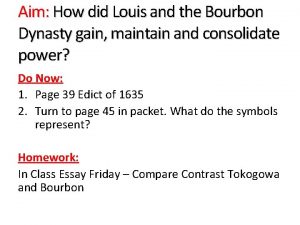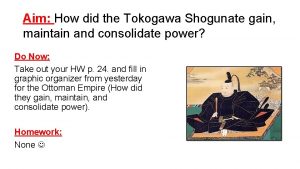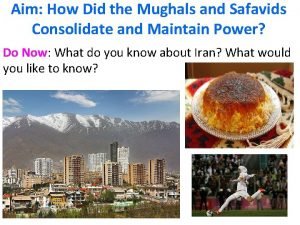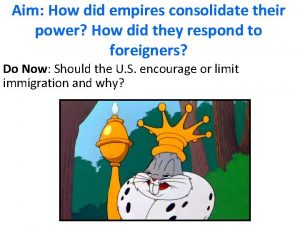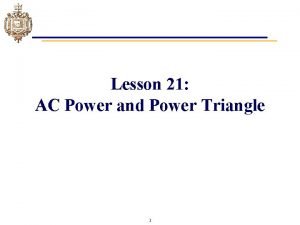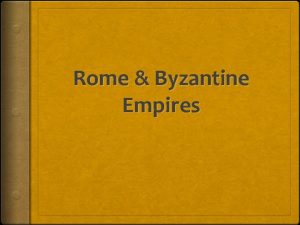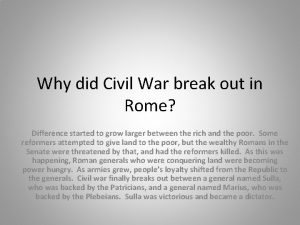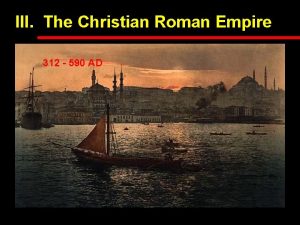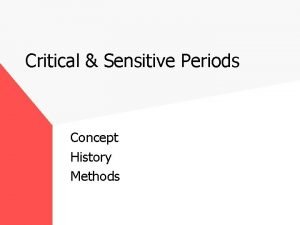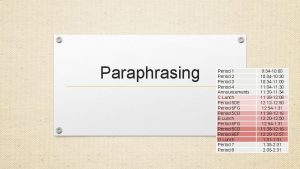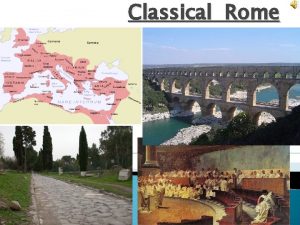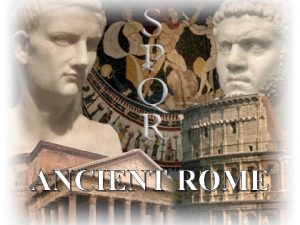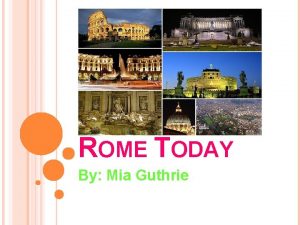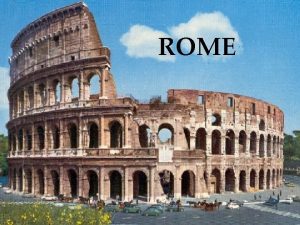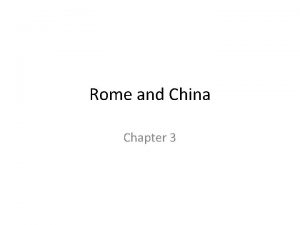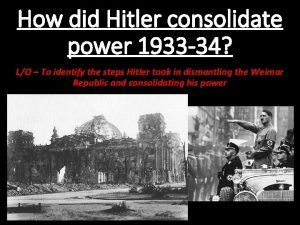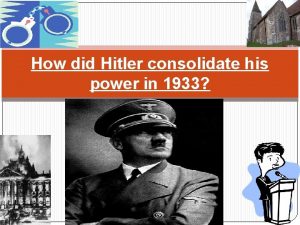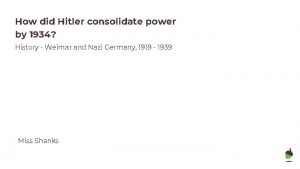Aim How did Rome consolidate its power Period





















- Slides: 21

Aim: How did Rome consolidate its power? Period Two 600 BCE – 600 CE NY State Standards 2, 3, 4 Common Core RS 5, 6, 9, WS 1


Geography of the Italian Peninsula ü Italy is a peninsula on the Mediterranean Sea. ü Rome is in center of Italy, and consisted of 7 hills. The most famous is the Palatine. ü The Apennine Mountains and the Alps are less rugged than the mountains in Greece ü Main Rivers: Tiber, Po & Arno Tiber River Apennine Mountains

II Roman Beginnings A) The Latins settled by the Tiber river 800 BCE. Most were farmers. B) Greeks and Etruscans (originally from Asia Minor) already lived there! The Romans adopted ideas and beliefs from both of these cultures. üFrom the Etruscans: Engineering (including how to construct an arch) üFrom the Greeks: Greek polytheistic religion, art, philosophy, the Greek alphabet Wealthy Etruscans liked to be buried in replicas of their own homes. On the left an Etruscan husband wife were buried together.

Mediterranean Prior to Rome

Etruscan Arch

The Legend of Romulus and Remus Rhea was married to Mars, the Roman god of war. Rhea had twin sons. Due to plots by other gods to harm her sons, she set them adrift on the Tiber, hoping someone would find them. First they were found by a she-wolf who fed them. Then a shepherd and his wife adopted the boys. As the twins grew older, they decided they didn’t want to be shepherds; they wanted to be kings. They decided to build a city on the shores of the Tiber. They quarreled as they both decided they wanted to be the sole King. In a fit of rage, Romulus picked up a rock, killed Remus, and made himself king. Thus, began the city of Rome.

Rape of the Sabine Women According to the Roman historian Livy, Romulus asked the neighbors of Rome to allow their women to marry Roman men. The neighbors said no. Romulus then arranged a religious festival and invited his neighbors. When everyone was drunk, the Romans grabbed the women. It wasn’t all bad; Romulus promised the women citizenship and happy marriages!

III The Roman Monarchy 753 BCE - 509 BCE A) From 753 BCE to 509 BCE, the legendary Roman monarchy ruled, of which there were said to be 7 Kings beginning with Romulus. B)The Latins drove out the last Etruscan King in 509 BCE the Roman Republic to prevent any one person from gaining too much power. C) The Roman Forum was built. A Republic is a type of democracy where the citizens vote for a someone to represent them.

The Roman Republic A) Controlled by 300 senators who served for life. B) Each year the Senate elected 2 consuls. Consuls served one term, supervised government workers and commanded the army. *Each consul could veto the other. C) During war, the Senate could elect a dictator, a ruler with absolute power for 6 months. All of these positions could only be filled by members of the patrician class (the most wealthy). Recall that Athens created the first democracy in the 5 th century BCE. As Rome’s population was much bigger than Athens, a direct democracy was not possible.

The Roman Republic Continued… D) The plebeians (lower class) began to protest their lack of power in the Roman Republic. 1. By 494 BCE plebeians could elect a tribune (who could veto laws). 2. 450 BCE the 12 Tables (Roman laws divided into 12 tables) was placed in the Roman Forum. Excerpts of 12 Tables: III One who has confessed a debt… shall have 30 days to pay it in. After that forcible seizure of his person is allowed. V Females should remain in guardianship even when they have attained their [adulthood]. VIII If any person has sung or composed against another person a song such as was causing slander or insult. . he shall be clubbed to death. " Table XI Marriages should not take place between plebeians and patricians.

The Roman Republic Checks & Balances LEGAL CODE 12 Tables EXECUTIVE 2 Consuls: elected by assembly for 1 year, commanded army Dictator chosen by Senate during war up to 6 months LEGISLATIVE Senate of 300, chosen from aristocracy Centuriate Assembly of citizen-soldiers, for life: elected consuls, made laws Tribal Assembly: Elected tribunes CITIZENSHIP Plebeians Patricians Freed Slaves Client state limited citizenship JUDICIAL Praetors: 8 judges chosen for 1 year by Centuriate Assembly

Roman Expansion A) By 270 BCE Rome had expanded into all of the Italian peninsula. They did this by 1. Building an extensive road system 2. Standing, efficient and well paid army 3. Made many conquered people citizens, and respected local culture. *Citizens had to pay taxes & perform military service. 4. Gained control of most of the Mediterranean after fighting the Phoenicians in the Punic Wars.

All Roads Lead to Rome! Romans built roads to link captured cities with Rome and establish them as colonies. There were road signs, mile markers, police posts, roadside inns, and way stations to change horses!

Roman Expansion Continued… By the time the First Punic War, Rome had become the dominant power throughout the Italian peninsula, while Carthage–a powerful city-state in northern Africa–had established itself as the leading maritime power in the world. The First Punic War broke out in 264 BCE when Rome interfered in a dispute on the Carthaginian-controlled island of Sicily, and ended with Rome in control of both Sicily and Corsica. In the Second Punic War, the Carthaginian general Hannibal invaded Italy and scored victories at Lake Trasimene and Cannae before his defeat by Rome's Scipio Africanus in 202 BCE which left Rome in control of the western Mediterranean and much of Spain. In the Third Punic War, the Romans, led by Scipio the Younger, captured and destroyed the city of Carthage in 146 BCE. – history. com


Carthage Harbor

Hannibal, The Man Who Almost Defeated Rome Hannibal was the leader of the Phoenicians during the 2 nd Punic War. He surprised Rome by coming by land across the Alps on horses and elephants. He had hoped to gain the help of Rome’s enemies, but he could not find many, as Rome tended to treat its conquered people well. Hannibal almost won the war, until Rome changed strategy and attacked his home-city of Carthage. Hannibal returned to Carthage, where he was defeated. In revenge, the Romans destroyed Carthage and salted the ground so nothing would grow for years.

Results of Roman Expansion A) After the Punic Wars, many farms were abandoned or turned into apartment buildings for the poor. B) Rome began to import grain and luxury goods from across the empire. This led to debt. C) The Roman Republic was becoming less democratic and more like an oligarchy.

Focus Questions 1. What is the difference between the legend of Romulus and Remus, and the historical founding of Rome? 2. How was the Roman Republic similar to Athenian democracy? How was it different? Which system of government do you think is better and why? 3. Describe the main events (or make a flow chart) that led to the expansion of Rome. How did the expansion of Rome change life in the Mediterranean? Was it for the better or worse?

Key Vocabulary ü 12 Tables ü Apennine Mountains ü Arno River ü Carthage ü Consul ü Dictator ü Etruscans ü Hannibal ü Latins ü Oligarchy ü Patricians ü Phoenicians ü Plebeians ü Po River ü Punic Wars ü Republic ü Rome ü Senate ü Tiber River ü Tribune ü Veto
 How did mussolini consolidate power
How did mussolini consolidate power How did louis xiv gain, consolidate, and maintain power?
How did louis xiv gain, consolidate, and maintain power? How did the tokugawa shogunate gain power
How did the tokugawa shogunate gain power How did the mughals consolidate their power
How did the mughals consolidate their power How do empires consolidate their power?
How do empires consolidate their power? How did rome get its name
How did rome get its name Data warehouses generalize and consolidate data in space.
Data warehouses generalize and consolidate data in space. Consolidate duplicate conditional fragments
Consolidate duplicate conditional fragments 12 core values
12 core values Real power and reactive power
Real power and reactive power Byzantine empire at its height
Byzantine empire at its height What caused the fall of the roman empire
What caused the fall of the roman empire Rome location
Rome location Why did civil war break out in rome
Why did civil war break out in rome To where did constantine move rome's capital
To where did constantine move rome's capital What advantages did rome's location offer?
What advantages did rome's location offer? The development of children 7th edition
The development of children 7th edition Absolute refractory period and relative refractory period
Absolute refractory period and relative refractory period When is the relative refractory period
When is the relative refractory period Critical period vs sensitive period
Critical period vs sensitive period Critical period vs sensitive period
Critical period vs sensitive period Approaches to child development
Approaches to child development

